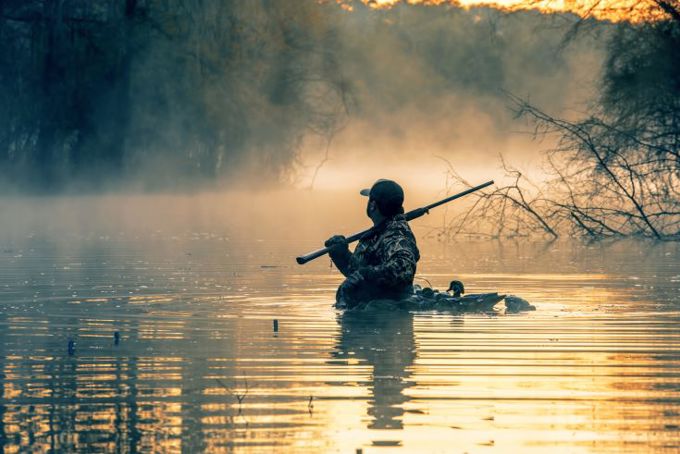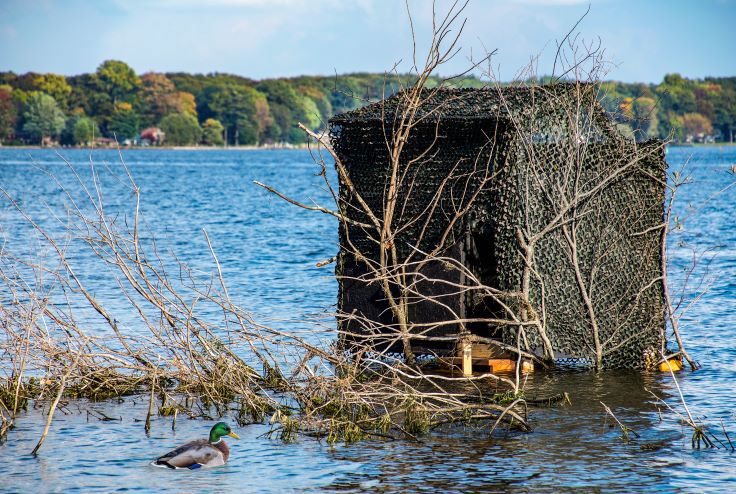
Waterfront Property Owners Who Hunt Ducks or Other Waterfowl in the Commonwealth of Virginia
Introduction
Waterfront property owners in Virginia enjoy many benefits, among them . . . enhanced property value, use of the water for household purposes and/or irrigation, navigation rights, the view amenity, and preferential licensing for oyster aquaculture (to name a few). This article highlights another benefit that Virginia law confers on the waterfront property owner, namely the ability of the waterfront property owner to erect a stationary blind on shore and in the public waters for the purpose of hunting ducks or other waterfowl, as provided by Virginia Code §29.1-344.
Overview of the Licensing Requirements for Those Who Hunt Ducks or Other Waterfowl in the Commonwealth of Virginia
The Virginia Department of Wildlife Resources, formerly known as the Department of Game and Inland Fisheries, manages the wildlife resources of the Commonwealth of Virginia. The U.S. Fish & Wildlife Service also has a role with respect to threatened or endangered species, and also with respect to migratory birds (which includes ducks and other waterfowl). Speaking broadly, a person who wants to hunt ducks or other waterfowl in Virginia must have a hunting license issued by DWR (unless hunting on his or her own land), a federal duck stamp issued by USFWS, a migratory waterfowl conservation stamp issued by DWR (unless hunting on his or her own land), and a Virginia harvest information program authorization (issued by USFWS).

Photo credit: Maria Dryfhout
Privilege Enjoyed by Waterfront Property Owners Who Hunt Ducks or Other Waterfowl
Virginia Code §29.1-344 sets out the preferred position enjoyed by waterfront property owners in Virginia who hunt ducks or other waterfowl. The key language is as follows: “the owners of riparian rights, their lessees or permittees shall have the exclusive privilege of licensing and erecting stationary blinds on their shoreline, and the prior right of licensing and erecting stationary blinds in the public waters in front of their shoreline, to shoot waterfowl over the public waters. . . . When such a license has been obtained and a stake or a stationary blind has been erected on the site with the license for that season properly affixed, no other stationary or floating blind shall be located in the public waters within 500 yards of the licensed site without the consent of the riparian owner, lessee or permittee.” (Italicization and bolding added to the quoted language, for emphasis.) The regulations issued by DWR have complimentary language reinforcing the 500 yard exclusion zone (4 VAC 15-260-35).
Not every duck or other waterfowl hunter operates from a blind. Some hunters shoot ducks or other waterfowl from boats or rafts. Virginia Code §29.1-349(A) requires these hunters to remain 500 yards clear of the stationary blind erected by the waterfront property owner. Subsection B very helpfully provides that “No person shall erect a stationary blind in the public waters within 500 yards of any other licensed blind without the consent of the licensee. Any person who violates this subsection shall be guilty of a trespass, and the affected blind licensee may maintain an action for damages. Furthermore, the trial court shall immediately revoke the blind owner’s license for the stationary blind where the offense was committed.”
The practical effect of these statutes and the regulation is to give the riparian property owner privileged positioning in the competitive landscape occupied by those who hunt ducks and other waterfowl in the Commonwealth of Virginia. He or she possess the exclusive right to erect a stationary blind either on his or her waterfront property, or in the public waters in front of the shoreline, after which all other duck or waterfowl hunters are forbidden to erect a stationary blind of their own, or to hunt from a boat or raft, unless positioned at least 500 yards away.

Photo credit: Dasytnik
Conclusion
The attorneys on our Waterfront Property Law Team have strong connections and significant legal experience. As you can tell from the time a few years ago when one of our attorneys removed his shoes and got in the water to fend off a criminal enforcement action being filed against our client, we go the extra mile for our clients, if that is what is needed to get the job done.
Contact Jim Lang if you would like to see him publish more information on how the hunting rights of waterfront property owners in the state of Virginia. Of course, you can always .
